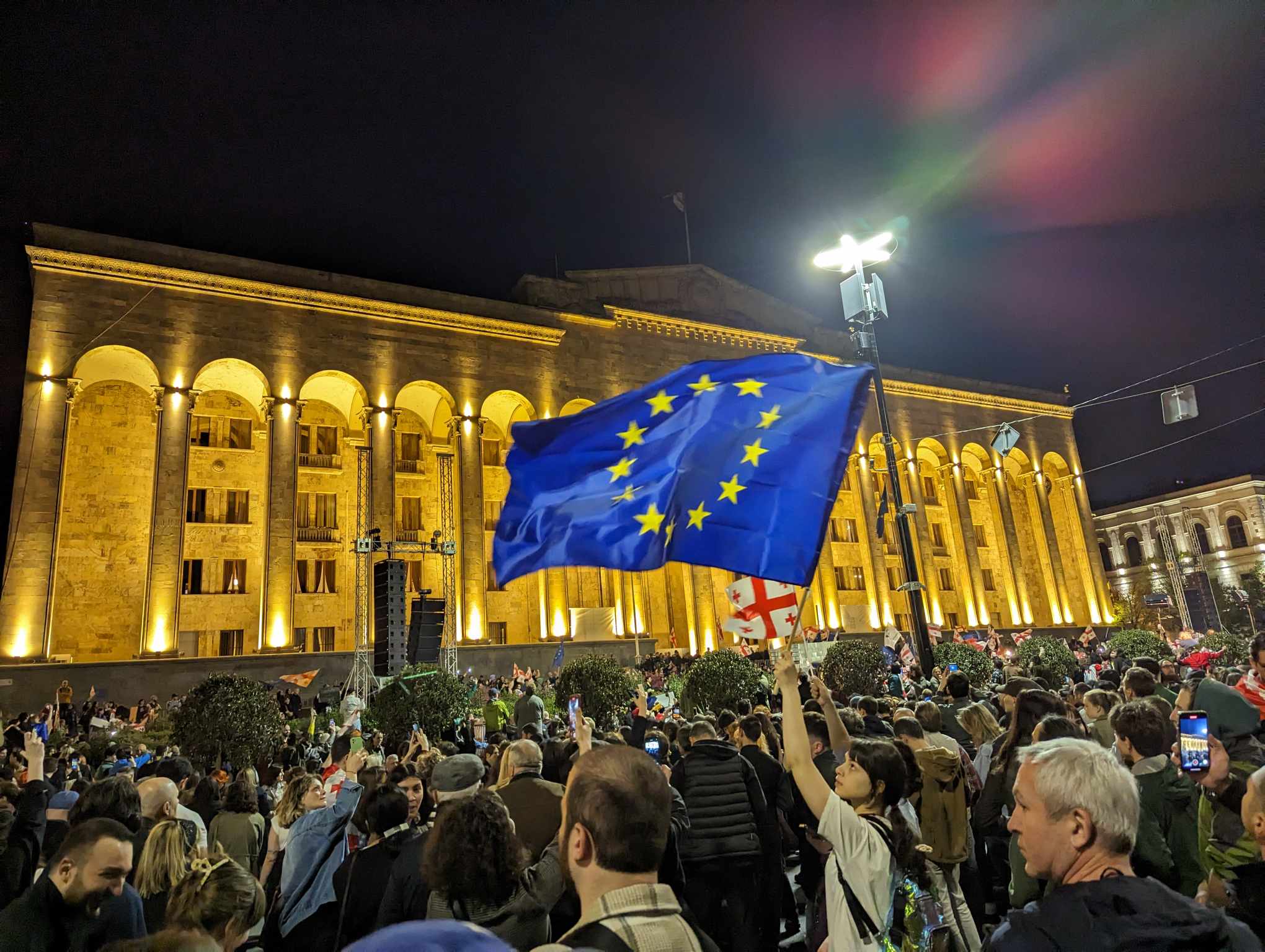The EU is preparing a response to Georgia’s adoption of the Russian-style foreign agents law and the related developments. In his latest weekly newsletter, Rikard Jozwiak, Europe editor for RFE/RL, explains how the EU is expected to respond to the backslide in Georgia.
The analysis is based on the options paper, seen by RFE/RL, and prepared by the EU’s diplomatic arm, the European External Action Service, which considers how the EU could reorient its policy toward Georgia and notes that the Georgian government has taken “other worrying steps in recent months,” citing controversial laws such Foreign Agents’ law, the so-called anti-LGBT propaganda legislation, amendments to the electoral code, and also “steps affecting the independence of the Georgian National Bank.”
According to Rikard Jozwiak, the options paper outlines three levels of potential action, of which short-term measures are the easiest to agree on and thus most likely to be taken.
Short-Term Measures Do Not Require Unanimity
The document notes that the short-term measures can be adopted immediately, without the need for unanimity of all EU member states, and they can be lifted “once the [foreign agents] law is repealed, and provided that EU concerns on democratic backsliding are sufficiently addressed and…accompanies by clear public messages.”
“According to the options paper, these short-term measures would consist of scaling down engagement with the Georgian authorities and halting the disbursement of EU funds to the country. That could mean high-level bilateral visits are suspended and ongoing negotiations on, for example, lowering roaming tariffs between the bloc and Georgia are paused,” the author writes. He adds that EU funds could also be redirected from the government to civil society and independent media. Another option is to freeze the impending adoption of a 30-million-euro package of non-lethal military aid.
None of these measures require unanimity of the Member States and could be taken “swiftly” by the European Commission, Jozwiak writes.
At the June 24 meeting of the EU Foreign Affairs Council in Luxembourg, the paper says, most states wanted to move quickly, especially Estonia and Lithuania, while others, such as Hungary and Slovakia, “preferred to proceed more slowly.” This issue will again be discussed during EU summit in Brussels on June 27-28.
Second Level Measures Taken “In Case of Further Deterioration”
According to Jozwiak, second-level measures will be taken “in case of further deterioration” which could include the use of violence against peaceful protesters and intimidation or major irregularities in the electoral process. “Under such circumstances, the recommendation would be for member states to introduce a temporary Schengen visa requirement for all holders of Georgian diplomatic passports,” and according the RFE/RL correspondent, the options paper notes that “this measure could have a symbolic value to restrict the privileges of the government officials/diplomats, while not affecting the general population.”
Visa bans and asset freezes can also be imposed on individuals and entities under the EU’s Global Human Rights Regime. The EU has used these tools to target those it deemed responsible for the imprisonment and death of the Russian opposition figure Aleksei Navalny.
However, there are several problems with these measures: first, they require unanimity among the EU’s 27 member states to be adopted, and “consensus is often hard to find.” Second, he also stresses that it is not always easy to find concrete evidence linking serious human rights violations to the actions of officials.
Notably, the second-level measures would not target the high-ranking Georgian officials, but rather lower-level judges and police chiefs.
Third Level Measures “Most Severe” but Less Likely
The third, “most severe” type of measures will be adopted in case of a “significant deterioration of the situation” and will be “steps related to the enlargement path” as per the options paper presented to EU foreign ministers.
While Ukraine and Moldova opened the formal accession talks with the EU on June 25, Georgia won’t move forward for now. It could, theoretically lose its candidate status, but this has never happened before and would require all member states to be on board, the author notes.
“The nuclear option would be suspending visa liberalization to the EU,” Jozwiak writes, stressing that if this is to happen, it will be in the fall, when the European Commission presents its annual report on visas. He also notes that a qualified majority of EU member states would be enough for the initial nine-month suspension. Such a suspension is unlikely, however, and is seen as a rather blunt instrument that has only been used once in the EU’s history: against the South Pacific island nation of Vanuatu.
The options paper prepared by the EEAS, while acknowledging that “this measure could be powerful leverage for Georgia to reconsider the law at stake”, states that “its immediate negative impact would be on the Georgian population” and adds that the focus should be on “entry bans against individuals” and member states committing to not granting “visa exemptions to service or diplomatic passport holders.”
Also Read:
